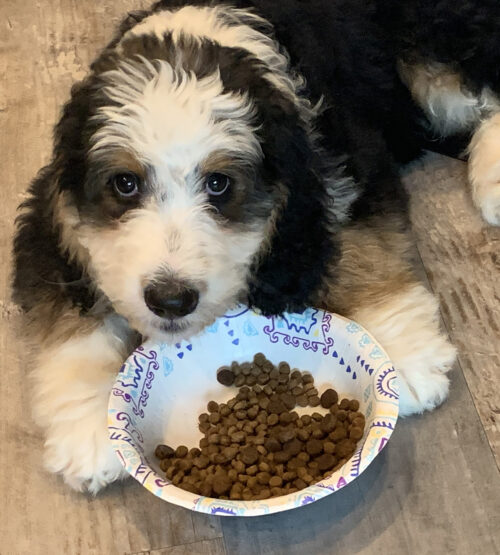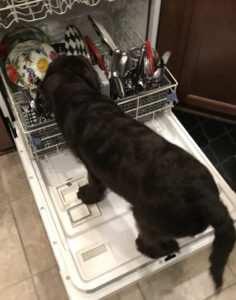Doodle Health & Care
Puppy Food & Health-Care

Food-–There are excellent food options available from online retailers and pet stores. We like the Fromm Family foods. Whichever you choose, and your vet will be a good resource, here are a couple of hints:
—meat should be the first ingredient
—do not use “grain free” on larger breeds
—if pup has a sensitive stomach, add a little white rice with less kibble until stomach settles
—“Puppy” variety for at least the first year. Offers more nutrients and calories for growing dogs
—check for recalls from different dog food companies, if there are many, you might want to avoid that one
Grooming -–Labradoodles will need to be groomed every 6-8 weeks. It helps if you keep up with brushing to work on “mats” or “knots.” Groomers are going to ask what type of look you want—entirely up to you. We ask for ours for a shaggy puppy cut (longer top of head, tail, chest, stomach and lower legs, shorter body). If you wait too long, or don’t brush periodically, most groomers will recommend shaving them down rather than tormenting the pup trying to get knots out. Bernedoodles will only need 3-4 cuts per year—but we like them a little shaggy. If you prefer a neater look, work with your groomer on a schedule. We bathe them every 3-4 weeks in between groomings—Doodles don’t usually get smelly.
Vet Care -–If you don’t already have a Vet, ask friends with dogs if they have a Veterinarian they like. Heartguard is necessary, and needs a prescription. Depending on where you live and potential flea problems, you may need to treat with a flea/tick treatment. Yearly shots (after year 1) are also very important, and that annual check up gives you the opportunity to ask questions, and address puppy needs. It gives your Vet a chance to do a thorough once over of your animal—also very important, as there may be things you haven’t noticed, especially with a heavier coat.
Health Guarantee -–Puppies must see your vet within 7 days of leaving us, to insure that he/she is healthy. All puppies are going to get sick from time to time, hopefully minor things. Our warranty covers debilitating genetic conditions or life-threatening illness detected within the first 2 years. We will replace the puppy, or refund the amount you paid for the puppy. Thankfully, we have never had to do so!


Home with your new puppy


